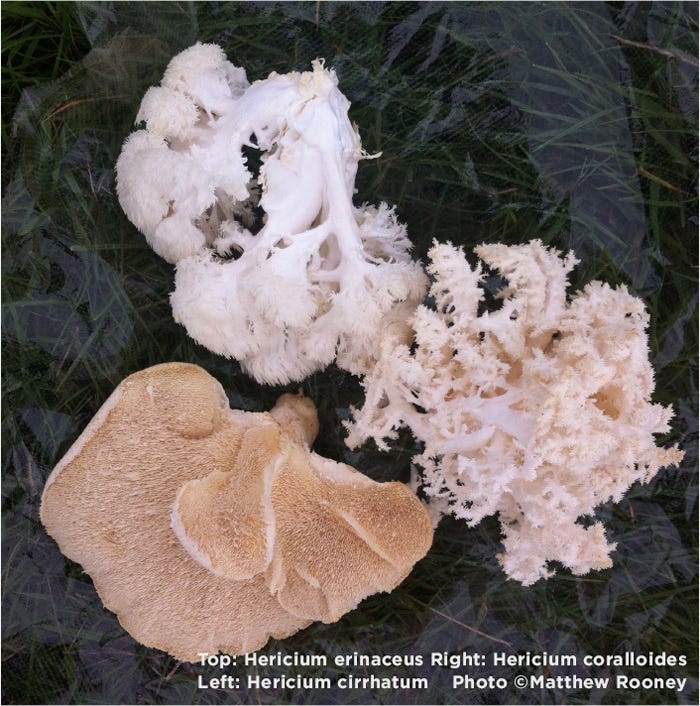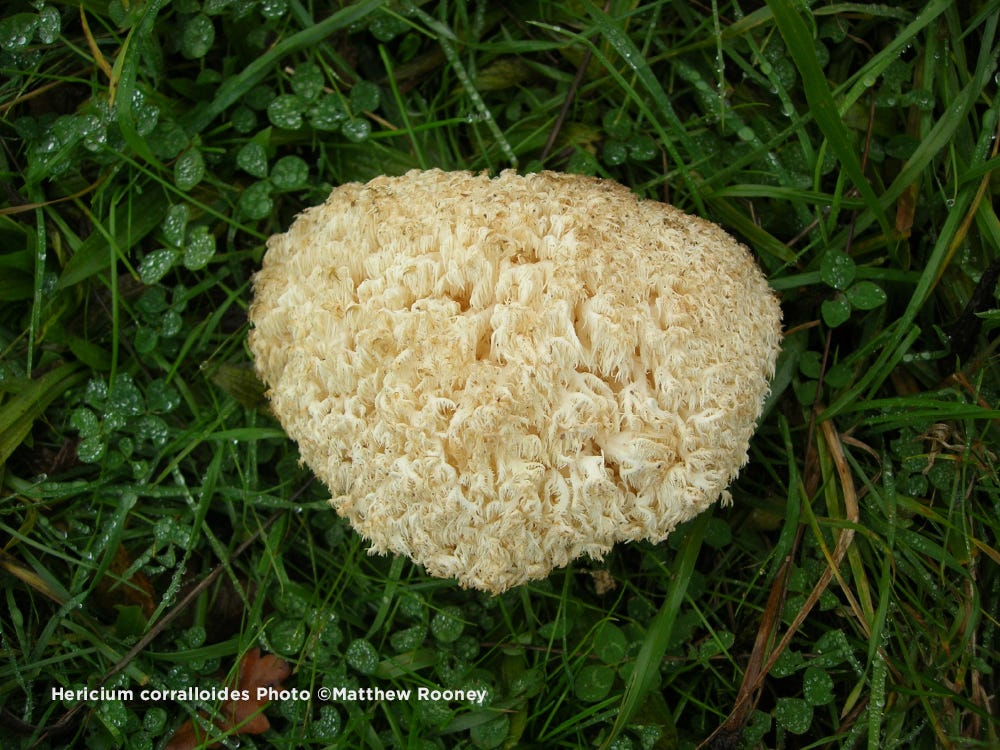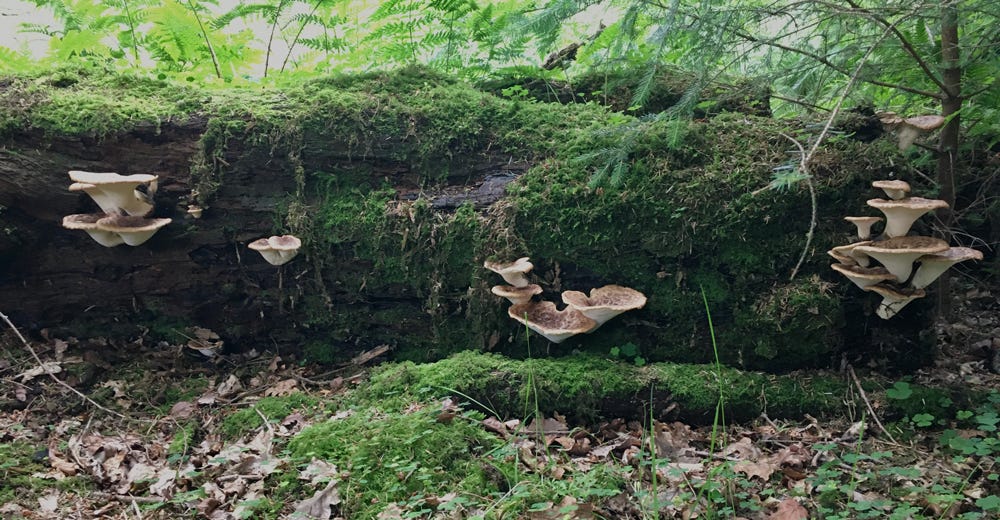
Some mushrooms shouldn't be picked because they are deadly poisonous, but occasionally a highly delectable gourmet edible species must just be admired and then left alone....
Lion’s mane (Hericium erinaceus)

This is a magnificent waterfall of a mushroom whose preferred habitat is ancient beech trees.
Lion’s mane faces two problems with loss of habitat. First, as we know, the amount of forest and woodland in the U.K. is a tiny fraction of what it once was and, despite that, humans are still claiming it for ‘development’. The ancient woodlands lost to HS2, for example, will take centuries to replace with the new planting. However, a far more prevalent problem is the felling of ‘unsafe’ trees as soon as any evidence of a fungus appears by the ever-zealous ‘health and safety’ brigade. Just a few months ago, as lockdown lifted, I returned to Almondell Country Park to find them in the midst of a large felling program of the older trees. One beautiful old birch cut down in the car park had barely a trace of fungus in the wood, clearly visible where it was chainsawed apart, and would have easily stood another 50 years and been host perhaps to Chaga.
A cherry tree - just at the age to be a perfect host for Chicken-of-the Woods - marked with a sinister red X, was next on the list.
Lion’s mane is endangered because we have removed its habitat and ‘health and safety’ prematurely fell its food source - old rotting beech trees. Some mushrooms, like the ubiquitous oyster mushroom or elegant porcelain fungus are there from the beginning. They like to get in quick and have a first feed. Once they have gone, other fungi take over the job of bioremediation, eating different nutrients. Lions mane likes its beech tree to be partially digested first and sadly these are the trees it is rare to find now.
Lions mane would be lost experience, that no one would ever get to taste any more, if it wasn’t so easy to grow! It has been cultivated by growing it on beech sawdust, wood shavings and possibly - in some of the larger mushroom farms - on other substrates.
The following are three species of Hericium grown organically on beech by Mushroom Table in East Anglia.
Many of the medicinal mushrooms are interchangeable for their enhancing effect on the immune system, but lions mane has its own very specific characteristics and each ‘general rule’ seems to have an exception for lions mane and its Hericium siblings! Here are some of its special properties:
Neuro health
Hericium species promote good brain and nerve health. The compounds erinacine and corallocins A-C promote nerve growth factor. Preclinical studies have shown that erinacines can improve symptoms in ischemic stroke, Parkinson's disease, Alzheimer's disease, and depression if erinacines are included in daily meals.
Gut health
Hericium spp. help gut problems - leaky gut syndrome, colitis, sensitive stomach lining, IBD. Water extracts interact with beneficial gut microbes and reduce inflammation.
Diabetes
Hericium spp. help to protect the liver, kidneys and pancreas from oxidative stress, reduce serum glucose and increase serum insulin.
Heart health
Hericium extracts lower LDL cholesterol and increase HDL cholesterol, help prevent LDL oxidation and resist HMG CO-A reductase activity.
Pain relief
Erinacine E from Hericium is a κ-opiod receptor agonist which can help with pain relief. Erinacine E is found in all Hericium species.
Atypical Differences
As a rule of thumb, a dried mushroom is up to 10 times lighter than a fresh, fleshy one. So a dose of 3 grams of dried mushroom would be equivalent to a serving of 30 grams of fresh mushroom. Most medicinal doses for mushrooms are from 3 dry grams a day in chronic cases to 6 dry grams a day in acute care.
However, with lions mane the ratio is 6 grams of fresh to 1 gram of dried and the current clinical doses (as used in trials) are 2 to 5 grams. So 12 grams would be the usual daily dose up to 30 grams in acute medicine (e.g. just after a stroke). But even a small amount will help -in one clinical trial cookies containing 0.5 g of fruiting bodies powder (equivalent to 3 grams fresh) alleviated the symptoms of depression, anxiety, frustration, and palpitation.
Another group took received three capsules containing 80% mycelium extract and 20% fruiting body extract daily for 8 weeks which significantly reduced depression and anxiety, as well improved sleep disorders. Assuming a standard capsule size of 500 mg this was 1.5 mg powder equivalent to 9 grams of fresh.
Usually, when using beta-glucans polysaccharides to support and supercharge the immune system you do have to boil medicinal mushrooms - ideally after coarse chopping, grinding or powdering them - to extract them from the hard, indigestible chitin that make up the cell wall. So teas and soups are preferable and the longer you leave them, the more you extract. So for general health I might just simmer a mushroom for 15 minutes but for my patients I put them in a slow cooker for 24 hours to get really deep, powerful decoctions.
However, with lions mane, it’s usually taken more for different compounds (e.g. erinacines A to H especially concentrated in the mycelium, hericenones A-K, amycenones...) rather than its polysaccharides. The most popular use being for cognitive health, nerve regrowth/protection and gut repair.
So these are extracted in alcohol (methanol in clinical trials but as that’s poisonous, ethanol for humans). Combined with the fact that it has very soft tissues, lions mane does not need such a long cooking time unlike e.g. turkey tails. You’ll get a few more extra properties if you cook it in a soup vs crab cakes but it will be negligible. In fact, if you boil lions mane too long it makes a jelly that won’t filter at all.
Use other mushrooms like turkey tails or reishi rather than lions mane if you specifically want the immune boosting beta-glucans polysaccharides, and for these, yes you need a stock, soup or other long boiled liquid decoction.
Lions mane is best just cooked in any culinary way or made into a tincture. If you really want a dual extract with immunomodulating properties combine a turkey tail or artist bracket water extract with a lions mane tincture (for example).
You can also eat lions mane raw (certainly cultivated ones that are grown on natural beech shavings not some strange substrate) but if you are not used to eating mushrooms you may need to build up tolerance - so probably best cooked. However, it is very easy to digest if cooked and has a lovely sweet taste.
Lions mane doesn’t store very well because it takes up moisture from the air easily. So must be thoroughly dried and sealed in a very airtight container or tinctured to keep it for long periods.
For seriously ill people the brand I recommend is Myconutri created by Martin Powell. Martin is a highly experienced TCM practitioner who has been working with mushrooms in China and the U.K. for decades. I trust him and his products. He is a good and generous soul.
So before you reach for the axe and fire up the chainsaw…
Left alone, each tree will host many fungi. When the time comes, an ancient tree will fall. Lying silent in a still glade or field for a few years, we will return and mark her presence when looking for mushrooms. As the years pass, slowly she’ll sink into the mosses as the crust fungi help her to her rest. Covered in a mossy bed, eventually unseen. Perhaps occasionally we might remember her as we stub our toe on a stump, catch a fragrance, a shaft of sunlight, or hear her spirit on the wind that ruffles the dust.
More information to visit our Herbalist
***Content of this blog/website is for information purpose only. It is not intended to substitute for legal or medical advice, or medical treatment or diagnosis. Consult your health care provider if you are experiencing any symptoms and before using any herbal product or beginning a new health regimen. When wildcrafting or foraging for plants, do so ethically; be accompanied by an expert; and always have absolute certainty of plant identification before using or consuming any herbs. by using any or all of this information, you do so at your own risk. No warranties are expressed or implied. Any application of the material provided is at the reader’s discretion and is his or her sole responsibility.



